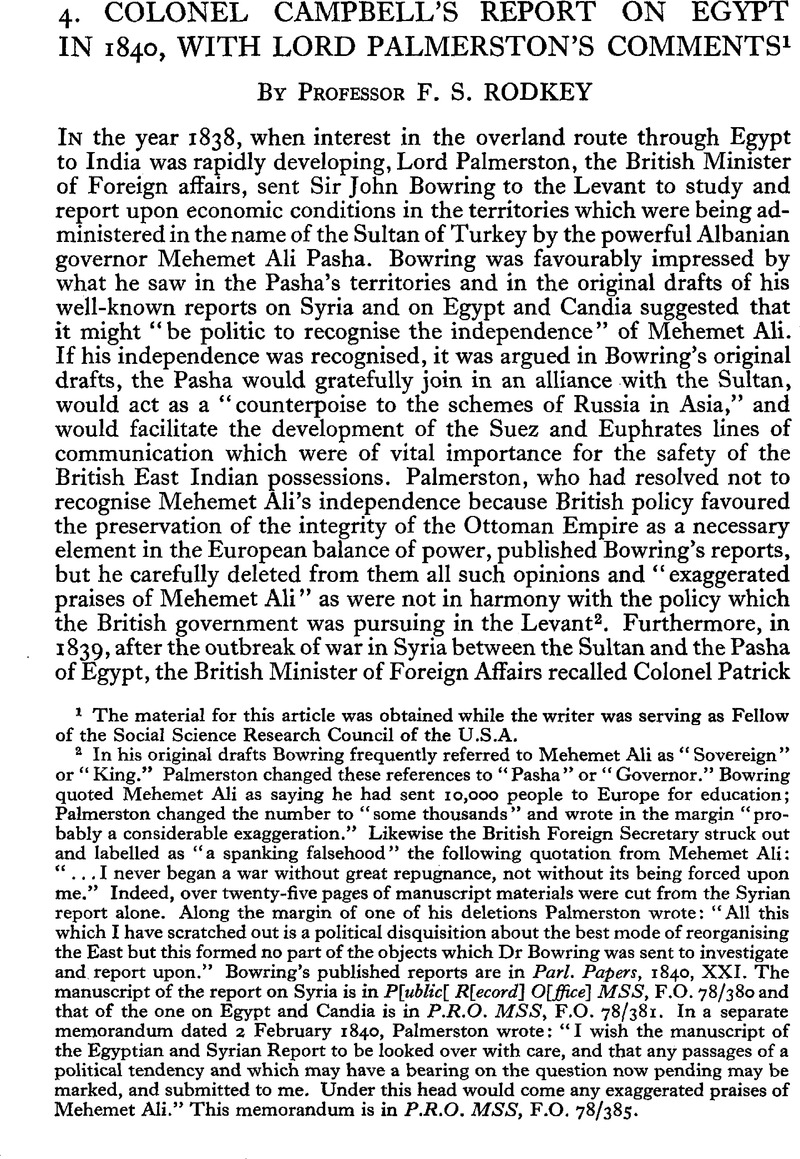Article contents
4. Colonel Campbell's Report on Egypt in 1840, with Lord Palmerston's Comments1
Published online by Cambridge University Press: 20 December 2011
Abstract

- Type
- Notes and Communications
- Information
- Copyright
- Copyright © Cambridge University Press 1929
References
page 102 note 2 In his original drafts Bowring frequently referred to Mehemet Ali as “Sovereign” or “King.” Palmerston changed these references to “Pasha” or “Governor ” Bowring quoted Mehemet Ali as saying he had sent 10,000 people to Europe for education; Palmerston changed the number to “some thousands” and wrote in the margin “probably a considerable exaggeration.” Likewise the British Foreign Secretary struck out and labelled as “a spanking falsehood” the following quotation from Mehemet Ali: “…I never began a war without great repugnance, not without its being forced upon me.” Indeed, over twenty-five pages of manuscript materials were cut from the Syrian report alone. Along the margin of one of his deletions Palmerston wrote: “All this which I have scratched out is a political disquisition about the best mode of reorganising the East but this formed no part of the objects which Dr Bowring was sent to investigate and report upon.” Bowring's published reports are in Parl. Papers, 1840, XXI. The manuscript of the report on Syria is in P[ublic[ R[ecord] O[ffice] MSS, F.O. 78/380 and that of the one on Egypt and Candia is in P.R.O. MSS, F.O. 78/381. In a separate memorandum dated 2 February 1840, Palmerston wrote: “I wish the manuscript of the Egyptian and Syrian Report to be looked over with care, and that any passages of a political tendency and which may have a bearing on the question now pending may be marked, and submitted to me. Under this head would come any exaggerated praises of Mehemet Ali.” This memorandum is in P.R.O. MSS, F.O. 78/385.
page 103 note 1 Campbell to Palmerston, 6 July 1840, P.R.O. MSS, F.O. 78/408 B.
page 103 note 2 Appendix No. 1, in Campbell's Report on Egypt, 6 July 1840, P.R.O. MSS, F.O. 78/408 B.
page 104 note 1 [Marginal comment by Palmerston] What moderation!
page 104 note 2 [Marginal comment by Palmerston] Why should he? So long as one man pays from the land all that the land produces why should the Pacha want to change the Drudge who is to do the work.
page 106 note 1 [Marginal comment by Palmerstonl Which he has not yet done.
page 106 note 2 [Marginal comment by Palmerston] This is very Laconic.
page 106 note 3 [Marginal comment by Palmerston] This was certainly a short way of gaining possession of these Peoples land.
page 106 note 4 [Marginal comment by Palmerston] But the land could [be]. This therefore was sheer robbery.
page 106 note 5 [Marginal comment by Palmerston] An ingenious expression for robbery.
page 107 note 1 [Marginal comment by Palmerston] and the less willing.
page 108 note 1 [Marginal comment by Palmerston] that is to say for his own commercial speculations.
page 108 note 2 [Marginal comment by Palmerston] only fancy the agriculture of England and rotation of crops fixed annually by order in council!
page 108 note 3 [Marginal comment by Palmerston] At an abitrary Price.
page 109 note 1 [Marginal comment by Palmerston] could is one thing would is another. Did he do so before he made war?
page 109 note 2 [Marginal comment by Palmerston] Probably not bad as it is.
page 109 note 3 [Marginal comment by Palmerston] but who forced him to make his war?
page 109 note 4 [Marginal comment by Palmerston] an ingenious expression for the act of plundering a whole People.
page 110 note 1 [Marginal comment by Palmerston] Ibrahim is well known to hate England and the English.
page 111 note 1 [Marginal comment by Palmerston] This is what is called improving the condition of the Peasantry. Taking all they produce, and giving them Debts in Return.
page 111 note 2 [Marginal comment by Palmerston] These agents must be ingenious if they can add to the vexations and extortions practised by the Gov't itself.
page 111 note 3 [Marginal comment by Palmerston] In other words he would find Honesty the best Policy.
page 111 note 4 Appendix No. 2, in Campbell's Report on Egypt, 6 July 1840, P.R.O. MSS, F.O. 78/408 B.
page 111 note 5 [Marginal comment by Palmerston] So much for the wisdom of the Pacha. The Report on agriculture disposes of his honesty and Justice.
page 112 note 1 [Marginal comment by Palmerston] So much for his zeal for civilisation.
page 112 note 2 [Marginal comment by Palmerston] it seems on the contrary to be inferior to their own because their own is Productive and of this Colonel Campbell says that the best thing Mehemet could do would be to destroy all his manufactures and throw his machinery into the Nile.
page 113 note 1 [Marginal comment of Palmerston] and this he calls Egyptian Manufacture.
- 1
- Cited by


